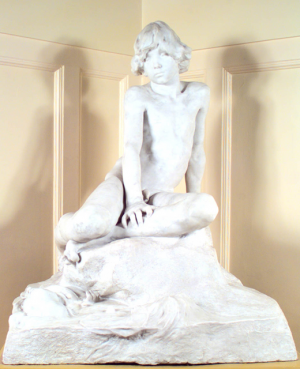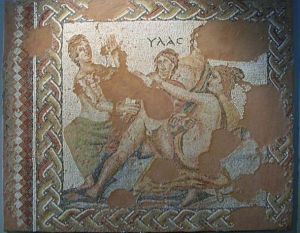(Boylove Documentary Sourcebook) - A Combination of Pederastic and Heteroerotic Contents in the Ancient Greek Myth of Heracles, Hylas and the Nymphs, as Depicted in a Poem by Theocritus: Difference between revisions
Dandelion moved page (Boylove Documentary Sourcebook) - A Combination of Pederastic and Heteroerotic Contents in the Ancient Greek Myth of Heracles, Hylas and the Nymphs, as Depicted in a Poem by Theocritus to The Ancient Greek Myth of Heracles, Hylas and the Nymphs, as Depicted by Theocritus Tag: New redirect |
Replaced the internal link with the new content of the page Tag: Removed redirect |
||
| Line 1: | Line 1: | ||
[[File:Carl Milles - Hylas.png|thumb|center|<i>Hylas</i> (1899). Marble sculpture by Carl Milles. Västerås, Konstmuseum.]] | |||
From <i>Idylls</i> (Ancient Greek: Εἰδύλλια <i>Eidullia</i>, c. 270 BC) by Theocritus, in <i>Theocritus. Moschus. Bion</i>, translated by Neil Hopkinson, <i>Loeb Classical Library</i> (Cambridge, Massachusetts: Harvard University Press, 2015). Footnotes omitted. | |||
<div style="margin:.5em auto; width:95%; min-height:5em; background-color:#F5FAFF; border:3px solid #c9c9ff; padding:1em;"> | |||
<center><b><i>IDYLL 30</i></b></center> | |||
Not for us alone, Nicias, as we used to think, was [[Eros|Love]] begotten by whichever of the gods was his father: we are not the first to admire beauty, we who are mortal and do not know what tomorrow brings. The bronze-hearted [[Heracles (mythology)|son of Amphitryon]], too, who withstood the fierce lion, [[Pederasty in ancient Greece|loved a boy]], the graceful Hylas who still wore his hair long. Just as a father teaches his dear son, he taught him all the knowledge that had made him fine and famous himself. He was never apart from him—neither as midday came on, nor when Dawn with her white steeds gallops up to the house of [[Zeus (mythology)|Zeus]], nor at the time when piping chicks look to their rest as their mother shakes her wings on her smoke-darkened perch—so that the boy might be trained as he wished and turn out a true man in company with him. | |||
Now when Jason son of Aeson was to set sail after the Golden Fleece, and there came as his companions the best heroes of every city as need dictated, then the man of many labors, son of Alcmena princess of Midea, came to wealthy Iolcus, and Hylas went down with him to the well-benched Argo, which did not touch the dark Clashing Rocks but shot straight through and sped into the deep river Phasis like an eagle over a vast expanse; since when the rocks have stood fixed. | |||
At the time when the Pleiades rise and, once spring has turned to summer, distant uplands pasture the young lambs, then that godlike band of heroes in their prime put their minds to seafaring. Taking their places in the hollow Argo, they arrived at the Hellespont after three days of southerly wind. They anchored within the Propontis, where the oxen of the Cians cut broad furrows as they wear down the plowshares. They disembarked on the beach and in the evening prepared their meal in pairs, though they laid a single bed on the ground for them all; for there was a meadow of great use for bedding, where they cut sharp sedge and thick galingale. Hylas of the golden hair went with a bronze vessel to fetch water for the meal for Heracles himself and steadfast Telamon, two comrades who always dined together. Soon he spotted a spring in a low-lying place; around it grew lush reed, dark celandine, green maidenhair, flourishing celery, and creeping dog’s-tooth grass. In the pool the Nymphs were in their stately dance, the Nymphs that never rest, goddesses feared by the country people, Eunice and Malis and Nychea with springtime in her eyes. The boy reached down, eager to dip his large pitcher in the fresh water; but the Nymphs all clung to his hand, all their tender hearts stricken with love for the Argive boy. He plummeted headlong into the dark water, just as a shooting star plummets headlong from the heavens to the sea, and a sailor says to the crew, “Make the tackle ready, lads: there’s a wind for sailing.” | |||
The Nymphs tried to console the weeping boy, holding him in their laps; but the son of Amphitryon, anxious about the lad, went off with his bow finely curved in Scythian style and his club, which his right hand always gripped. Three times he called for Hylas, as loud as his deep throat could bellow; three times the boy replied, but his voice came faintly from under the water, and though close by he seemed a long way off. At a fawn’s crying in the hills, a lion that eats raw meat rushes from its lair toward the meal that awaits; just so in the untrodden thickets of thorns Heracles was driven along in his agitation and desire for the boy, and he covered a great deal of ground. How unhappy lovers are! Greatly he suffered as he wandered the hills and thickets, and all Jason’s business was left behind. The ship was laden with the crew who were present, and it had its tackle aloft, but while they waited for Heracles the heroes took down the sails again at midnight. He in his madness went wherever his feet led him: a cruel god was breaking his heart. | |||
That is how the handsome Hylas came to be numbered among the blessed ones; but Heracles was mocked as a deserter by the Argonauts because he had abandoned the Argo with its thirty benches; and it was on foot that he came to the Colchians and the inhospitable Phasis. | |||
</div> | |||
[[File:Hylas being abducted by the naiads of Mysia.jpg|thumb|center|Ancient [[Ancient Greece|Greco]]-[[Ancient Rome|Roman]] pavimental mosaic panel depicting the abduction of Hylas by the Mysian naiads (c. 2nd–3rd Century AD). Amphipolis, Archaeological Museum.]] | |||
==See also== | |||
*[[Adult friend (dictionary)]] | |||
*[[Age of attraction (dictionary)]] | |||
*[[Athenian pederasty]] | |||
*[[Boylove]] | |||
*[[Cretan pederasty]] | |||
*[[Ephebophilia]] | |||
*[[Erastes]] | |||
*[[Eromenos]] | |||
*[[Greek love]] | |||
*[[Historical boylove relationships in ancient Greece]] | |||
*[[Loved boy (dictionary)]] | |||
*[[Minor-attracted person (dictionary)]] | |||
*[[Pedophilia]] | |||
*[[Philosophy of ancient Greek pederasty]] | |||
*[[Spartan pederasty]] | |||
*[[Theban pederasty]] | |||
*[[Young friend (dictionary)]] | |||
==External links== | |||
*[https://greek-love.com/antiquity/greek-practices/pursuit-and-flight-by-sir-kenneth-dover <i>PURSUIT AND FLIGHT</i> BY SIR KENNETH DOVER (Greek Love Through the Ages)] | |||
*[https://greek-love.com/antiquity/greek-practices/greeks-pedicate-loved-boys-pederasty DID THE GREEKS PEDICATE THEIR LOVED BOYS? (Greek Love Through the Ages)] | |||
[[Category:Boylove Documentary Sourcebook]] | |||
[[Category:Reference material on ancient Greece]] | |||
[[Category:Greek mythology]] | |||
[[Category:Roman mythology]] | |||
[[Category:Greek literature]] | |||
[[Category:Boylove in literature]] | |||
[[Category:Poetry]] | |||
Latest revision as of 04:04, 27 August 2021

From Idylls (Ancient Greek: Εἰδύλλια Eidullia, c. 270 BC) by Theocritus, in Theocritus. Moschus. Bion, translated by Neil Hopkinson, Loeb Classical Library (Cambridge, Massachusetts: Harvard University Press, 2015). Footnotes omitted.
Not for us alone, Nicias, as we used to think, was Love begotten by whichever of the gods was his father: we are not the first to admire beauty, we who are mortal and do not know what tomorrow brings. The bronze-hearted son of Amphitryon, too, who withstood the fierce lion, loved a boy, the graceful Hylas who still wore his hair long. Just as a father teaches his dear son, he taught him all the knowledge that had made him fine and famous himself. He was never apart from him—neither as midday came on, nor when Dawn with her white steeds gallops up to the house of Zeus, nor at the time when piping chicks look to their rest as their mother shakes her wings on her smoke-darkened perch—so that the boy might be trained as he wished and turn out a true man in company with him.
Now when Jason son of Aeson was to set sail after the Golden Fleece, and there came as his companions the best heroes of every city as need dictated, then the man of many labors, son of Alcmena princess of Midea, came to wealthy Iolcus, and Hylas went down with him to the well-benched Argo, which did not touch the dark Clashing Rocks but shot straight through and sped into the deep river Phasis like an eagle over a vast expanse; since when the rocks have stood fixed.
At the time when the Pleiades rise and, once spring has turned to summer, distant uplands pasture the young lambs, then that godlike band of heroes in their prime put their minds to seafaring. Taking their places in the hollow Argo, they arrived at the Hellespont after three days of southerly wind. They anchored within the Propontis, where the oxen of the Cians cut broad furrows as they wear down the plowshares. They disembarked on the beach and in the evening prepared their meal in pairs, though they laid a single bed on the ground for them all; for there was a meadow of great use for bedding, where they cut sharp sedge and thick galingale. Hylas of the golden hair went with a bronze vessel to fetch water for the meal for Heracles himself and steadfast Telamon, two comrades who always dined together. Soon he spotted a spring in a low-lying place; around it grew lush reed, dark celandine, green maidenhair, flourishing celery, and creeping dog’s-tooth grass. In the pool the Nymphs were in their stately dance, the Nymphs that never rest, goddesses feared by the country people, Eunice and Malis and Nychea with springtime in her eyes. The boy reached down, eager to dip his large pitcher in the fresh water; but the Nymphs all clung to his hand, all their tender hearts stricken with love for the Argive boy. He plummeted headlong into the dark water, just as a shooting star plummets headlong from the heavens to the sea, and a sailor says to the crew, “Make the tackle ready, lads: there’s a wind for sailing.”
The Nymphs tried to console the weeping boy, holding him in their laps; but the son of Amphitryon, anxious about the lad, went off with his bow finely curved in Scythian style and his club, which his right hand always gripped. Three times he called for Hylas, as loud as his deep throat could bellow; three times the boy replied, but his voice came faintly from under the water, and though close by he seemed a long way off. At a fawn’s crying in the hills, a lion that eats raw meat rushes from its lair toward the meal that awaits; just so in the untrodden thickets of thorns Heracles was driven along in his agitation and desire for the boy, and he covered a great deal of ground. How unhappy lovers are! Greatly he suffered as he wandered the hills and thickets, and all Jason’s business was left behind. The ship was laden with the crew who were present, and it had its tackle aloft, but while they waited for Heracles the heroes took down the sails again at midnight. He in his madness went wherever his feet led him: a cruel god was breaking his heart.
That is how the handsome Hylas came to be numbered among the blessed ones; but Heracles was mocked as a deserter by the Argonauts because he had abandoned the Argo with its thirty benches; and it was on foot that he came to the Colchians and the inhospitable Phasis.

See also
- Adult friend (dictionary)
- Age of attraction (dictionary)
- Athenian pederasty
- Boylove
- Cretan pederasty
- Ephebophilia
- Erastes
- Eromenos
- Greek love
- Historical boylove relationships in ancient Greece
- Loved boy (dictionary)
- Minor-attracted person (dictionary)
- Pedophilia
- Philosophy of ancient Greek pederasty
- Spartan pederasty
- Theban pederasty
- Young friend (dictionary)